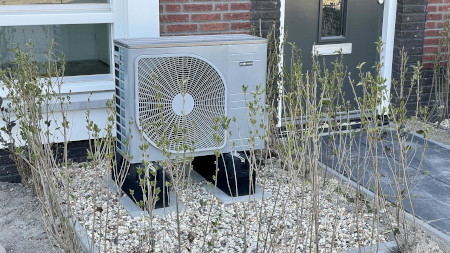
By Neil Kitching
Learn from my experience of installing a heat pump at home, then copy me if you can.
The single most important thing most of us can do to cut our carbon emissions is to install a heat pump closely followed by buying an electric car, or even better, owning no car.
The average UK household emits 2.5 tonnes of CO2 from burning natural gas to heat their house and hot water. 2.5 tonnes this year, next year and every year. Electricity is used to drive my heat pump. Using the latest UK grid emission factor, I could emit 1.4 tonnes, but my solar panels will reduce this to 0.8 tonnes. A 70% reduction and this will continue to improve as the UK grid decarbonises.
People ask me if my air source heat pump is noisy. The answer is no, and in any case it is outside.
Is it expensive? A bit, but less than a new kitchen. It is more expensive to install than a gas boiler although it should last longer and require less maintenance. My heat pump cost £10,000. I also had to install a new hot water tank, radiators, and pipework, costing a further £4,000.
In Scotland this cost is fully covered by grants and loans from Home Energy Scotland. In England a £5,000 boiler upgrade grant is available. However, costs are already falling. Centrica/ British Gas recently announced that they can install a heat pump “from £3,000”, or £500 in Scotland (both net of Government grants). Octopus have even more ambitious cost reduction targets.
Gas costs 10p per unit and burns in your boiler at 85% efficiency giving a cost of 12p per unit of heat. The standard tariff for electricity is 34p per unit. A heat pump operating at 320% efficiency gives a cost of 11p per unit of heat.
So, a heat pump is marginally cheaper to operate at standard tariffs than natural gas.
I moved to the Octopus ‘cosy’ electricity tariff. This offers different rates at various times of day. Their cheap rate is 20p; standard rate of 34p and a peak rate of 53p per unit.
I heat up my house during the cheap rate and as far as possible try to avoid using the heating during the peak rate. I also set my washing machine, dishwasher, tumble dryer and car charger to operate during the cheap rate. I avoid having an electric shower during the peak rate.
In the winter I charge my battery up using cheap rate electricity. The battery discharges during the more expensive times which in combination means I pay for nearly all my electricity at the cheap rate.
In summer, I will do even better. My solar panels will charge the battery during the day. Most of my electricity demand will be effectively free.
In combination I expect my energy to cost around £1,000. This is £1,500 less than the UK average bill of £2,500 per year. And I live in Scotland which is colder than most of England.
The heat pump heats the house more slowly than gas. So, we have our heating on for longer at a lower temperature. The house is less likely to overheat in the spring and autumn, and the whole house is maintained at a reasonable temperature throughout the winter.
The heat pump also heats our 200-litre hot water tank. I have set it to heat to 50oC once per day. Every week it automatically heats to 60oC to prevent any danger from legionella disease.
No, not all, but most. It may not be economic or practical to install in a small flat. Conversely, it may struggle to heat a large, leaky, older house. For the former, heat networks or direct electric heating may be more cost effective; for the latter there is the option of a hybrid heat pump that is ‘topped up’ by natural gas during freezing weather.
People are installing them in Europe - Sweden, France, Norway, and now Poland. The UK has got lazy, dependent on natural gas.
Until 2022, the price of electricity was too high in the UK in comparison to the relatively cheap price of gas. This is beginning to change.
Like all ‘new’ technology, pioneers and early-adopters are leading the way. But they are fighting against press ‘scare’ stories – usually arising when a heat pump hasn’t been installed properly. Like electric cars, heat pumps are about to reach a tipping point. The quality has improved, prices are falling, and the switchover will continue to be incentivised by government.
After all, heat pumps are safer, they don’t cause air pollution, they provide a good quality of heat, and they are the biggest thing you can do to cut your carbon footprint.
This article was originally published January 26, 2023 on Neil Kitching’s website.
